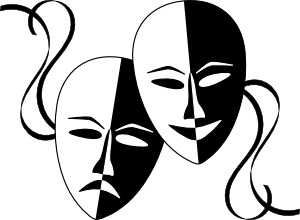| The source of art |
| As
long as we are in frequent contact with all actors of our social life,
we can easily communicate our needs and intentions. But since the
discovery of language, and especially since the extensive use and
distribution of written or otherwise recorded information we are
progressively exposed to influences from diverse sources, that mostly
no longer can be attributed with certainty to specific actors. |
| Even on a local scale, our modern
societies recruit millions of participants into mostly anonymous
networks. The bread we eat is produced from wheat we have never seen,
grounded by millers we don't know, and baken by bakers mostly unknown to us.
Economic dependencies ignore the old boundaries of nations and
continents. Partners in these networks seldom meet and mostly remain
totally hidden from each other. |
| Our
individual influence on these complex relationships is limited if
not absent. Nevertheless we feel a natural desire to be of influence,
to participate in this global concert. Of course, true participation is
frustrated by simple physical and physiological boundaries. It is
impossible to know millions of people. Therefore, participation is
mediated by identification with opinion leaders. We appreciate to hear
what we deem our opinion to be expressed eloquently by others. |
| These
others may be politicians, may be journalists, may be actors, or may
just sing a song. If they manage to express our feelings, they seed at
the bottom of our hearts the conviction that influence is possible. For
most of us, this conviction is sufficient to make us happy, and to keep
us going on with what we are doing for all these millions of anonymous
network participants. We might even prefer easy and superficial media
contents to sometimes more demanding communication with real
acquaintances. |
| The
desire to do "something real" often meets fulfilment in a creative act:
in writing a poem, acting in a play, delivering a public speech,
publishing in a newspaper, or in creating a piece of art. By this, we
ourselves aspire to a role as opinion leader, often without explicit
intention to do so. Maybe art did only arise after the loss of the
original primary communication networks, as some substitute for the
visibility of personal partners we depended on. |
| We
are talking and writing and singing into this reservoir of thoughts and
feelings, that everybody is free to tap for satisfaction and
consolation. It might appear crazy to do that, but it works. |
6/12 < MB
(6/12) > 9/12
see Senders and receivers (1/06)
|
